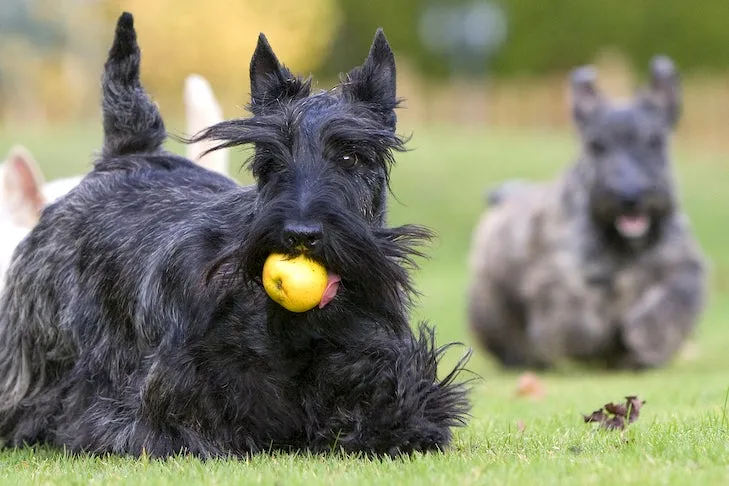As devoted pet parents, it’s natural to want to share everything with our beloved canine companions, including our favorite snacks. However, what’s safe and nutritious for humans isn’t always suitable for dogs. Their digestive systems process food differently, and certain human foods, particularly some fruits, can lead to severe health issues, and in extreme cases, even be fatal. Understanding What Fruits Should Not Be Given To Dogs is crucial for ensuring their well-being and preventing accidental poisoning. While dogs are omnivores, fruits and vegetables are not a dietary necessity but can be offered as occasional, safe treats. what human food can dogs eat as treats Knowing the difference between safe and harmful options is a cornerstone of responsible pet ownership.
This guide will help you identify which fruits are safe for your dog in moderation, and more importantly, which ones pose a significant risk and should be strictly avoided. We’ll also cover general safety guidelines to keep your furry friend healthy and happy.
Fruits Dogs Can Enjoy in Moderation
Many fruits offer a healthy boost of vitamins, minerals, and antioxidants for dogs when given as an occasional treat. Remember to always prepare them properly by removing seeds, pits, and rinds where necessary, and offer in small, appropriate portions.
Apples
Apples are a fantastic source of vitamins A and C, along with beneficial fiber. Their low protein and fat content make them an ideal snack, especially for senior dogs. Always remove the seeds and core, as apple seeds contain small amounts of cyanide. Frozen apple slices can be a refreshing treat on a warm day.
Bananas
A great low-calorie treat, bananas are rich in potassium, vitamins, biotin, fiber, and copper. They are also low in cholesterol and sodium. Due to their high sugar content, bananas should only be given sparingly as a treat rather than a regular part of their diet.
Blueberries
Considered a superfood, blueberries are packed with antioxidants that help protect against cell damage. They also provide fiber and phytochemicals. These small, nutrient-dense berries are a popular ingredient in many commercial dog treats and can be a fun training reward.
 Scottish Terriers playing in the grass.
Scottish Terriers playing in the grass.
Cantaloupe
Cantaloupe is loaded with nutrients, low in calories, and an excellent source of water and fiber, making it hydrating for your dog. However, it’s high in sugar, so offer it in moderation, especially if your dog is overweight or has diabetes. Freezing small cubes of cantaloupe can provide an enriching summer snack.
Cranberries
Both fresh and dried cranberries are safe in small amounts. While some dogs might not enjoy their tart taste, cranberries offer antioxidants. Be cautious with commercially dried cranberries, as they are often sweetened with added sugars, which dogs do not need. Opt for unsweetened fresh or frozen varieties.
Mango
This tropical fruit is a sweet and juicy source of vitamins A, B6, C, and E, as well as potassium and beta-carotene. Just like peaches, the hard pit of a mango contains small amounts of cyanide and can also be a choking hazard, so always remove it completely before offering. Mangoes are high in sugar, so keep servings small and occasional.
 Siberian Husky puppy being held up in front of an apple tree.
Siberian Husky puppy being held up in front of an apple tree.
Oranges
Veterinarians confirm that oranges are safe for dogs, though their strong citrus smell might deter some canines. They are a good source of vitamin C, potassium, and fiber. Only offer the juicy flesh in small quantities, and always remove the peel and any seeds. The peel is difficult for dogs to digest and contains oils that can upset their stomachs.
Peaches
Fresh or frozen peach slices are a good source of fiber and vitamin A. Crucially, the peach pit contains cyanide and must be completely removed and safely discarded to prevent ingestion. Avoid canned peaches due to their high sugar syrup content. Fresh peach flesh makes a great seasonal treat.
Pears
Pears are a healthy snack, rich in copper, vitamins C and K, and fiber. Similar to apples, the seeds and core of pears contain traces of cyanide, so ensure these are removed and the flesh is cut into bite-sized pieces. Canned pears with sugary syrups should also be avoided.
Pineapple
Small chunks of pineapple can be a sweet treat for dogs once the spiky outer peel and crown are removed. This tropical fruit is packed with vitamins, minerals, and fiber, and also contains bromelain, an enzyme that aids protein absorption. As with other fruits, opt for fresh, unsweetened pineapple over canned varieties.
Pumpkin
Pure pumpkin is a highly beneficial food for dogs, known for its antioxidants and its ability to help relieve both diarrhea and constipation. When buying canned pumpkin, always choose 100% pumpkin puree, not pumpkin pie filling, which contains added spices and sugar. Roasting fresh pumpkin and feeding the peeled flesh is another excellent option.
Raspberries
Raspberries are safe for dogs in moderation, offering antioxidants, low sugar, and good amounts of fiber, manganese, and vitamin C. Their anti-inflammatory properties can be particularly beneficial for senior dogs with aging joints. However, raspberries contain small, naturally occurring amounts of xylitol, so limit your dog’s intake to no more than eight ounces of fresh or frozen raspberries.
 Pembroke Welsh Corgi sniffing at a strawberry on a blue background.
Pembroke Welsh Corgi sniffing at a strawberry on a blue background.
Strawberries
Rich in fiber and vitamin C, strawberries also contain an enzyme that can help whiten your dog’s teeth. Like all fruits, they contain natural sugar, so they should be offered in moderation. Frozen strawberries can serve as a fun, refreshing enrichment treat.
Watermelon
Watermelon is a hydrating snack, rich in vitamins A, B-6, and C, as well as potassium. It’s approximately 92% water, making it excellent for keeping dogs hydrated on hot days. It is critical to remove all seeds and the rind before feeding watermelon to your dog, as both can cause intestinal blockages.
What Fruits Should Not Be Given to Dogs
While many fruits offer healthy benefits, some contain compounds, seeds, or parts that are dangerous, if not toxic, to dogs. It is paramount to keep these fruits completely out of your dog’s reach to ensure their safety and health. what foods dogs can t eat
Avocado
Although a healthy snack for humans, avocado should not be given to dogs. The pit, skin, and leaves of avocados contain persin, a fungicidal toxin that can cause vomiting and diarrhea in dogs. While the fleshy fruit contains less persin, it can still be enough to cause gastrointestinal upset. Furthermore, avocado flesh is high in fat, which can lead to pancreatitis or other digestive issues if consumed in large quantities.
Cherries
With the exception of the fleshy fruit around the seed, cherry plants contain cyanide, which is highly toxic to dogs. Cyanide interferes with cellular oxygen transport, meaning a dog’s blood cells cannot adequately receive oxygen. Symptoms of cyanide poisoning, which constitutes a veterinary emergency, include dilated pupils, difficulty breathing, and red gums. If you have a cherry tree, ensure fallen fruit is inaccessible to your dog. Always dispose of cherry pits in a secure, dog-proof trash receptacle.
Grapes and Raisins
Grapes and raisins are notoriously toxic to dogs, regardless of breed, sex, or age. Even small amounts can lead to acute kidney failure, a life-threatening condition. If you suspect your dog has eaten grapes or raisins, contact your veterinarian immediately. Be vigilant, especially if children are eating grapes or raisins in your home, and always secure these fruits in a dog-proof container or bin. what is the one meat that dogs should never eat
Tomatoes (Green Parts)
While the ripened red flesh of a tomato fruit is generally considered safe for dogs, the green parts of the plant, including stems, leaves, and unripe green tomatoes, contain a toxic substance called solanine. Although a dog would typically need to consume a large quantity of the plant to become ill, it’s safer to avoid giving them tomatoes altogether. If your dog enjoys exploring the garden, prevent access to tomato plants to minimize risk.
 Rottweiler laying down in the yard, its head tilted.
Rottweiler laying down in the yard, its head tilted.
Vegetables Dogs Can Eat
Just like fruits, many vegetables can be a healthy addition to a dog’s diet when given in moderation and prepared correctly. These offer various vitamins, minerals, and fiber.
Broccoli
Small amounts of broccoli are safe for dogs. It’s high in fiber and vitamin C and low in fat. However, broccoli florets contain isothiocyanates, which can cause mild to severe gastric irritation in some dogs. Cooked broccoli is often easier for dogs to digest, and tough stalks should be avoided as they can cause obstruction.
Brussels Sprouts
Brussels sprouts are nutrient-dense and packed with antioxidants beneficial for both humans and dogs. However, feeding too many can lead to excessive gas in dogs. Offer them sparingly to avoid digestive discomfort.
Carrots
Carrots are an excellent low-calorie snack, rich in fiber and beta-carotene, which converts to vitamin A. Their crunchy texture also helps clean your dog’s teeth. Carrots are a common ingredient in many dog foods and treats.
Celery
Celery provides vitamins A, B, and C, along with nutrients that support heart health and may help fight cancer. An added bonus is its reputation for freshening doggy breath.
Green Beans
Chopped, steamed, raw, or plain canned green beans are all safe for dogs. They are full of essential vitamins and minerals, high in fiber, and low in calories. Opt for no-salt added canned varieties or fresh/frozen beans.
Peas
Green peas, snow peas, sugar snap peas, and garden peas are generally fine for dogs. They offer several vitamins, minerals, and are rich in protein and fiber. Avoid canned peas with added sodium.
Spinach
While dogs can eat spinach, it’s not the top recommendation. Spinach is high in oxalic acid, which can hinder calcium absorption and potentially lead to kidney damage if consumed in very large quantities. Other vegetables might be a safer and more beneficial choice for regular feeding.
Vegetables Dogs Should Avoid
Some vegetables, although common in human diets, can be harmful or toxic to dogs and should be strictly excluded from their diet. what vegetables are dogs not allowed to eat
Asparagus
Asparagus isn’t toxic, but it offers little nutritional benefit for dogs. It’s too tough to eat raw, and cooking it down to a soft consistency significantly reduces its nutritional value. There are many other, more beneficial vegetables you can share with your dog.
Wild Mushrooms
Wild mushrooms are a significant hazard. While only a fraction of mushroom species are toxic, those that are poisonous can cause severe illness or even death. Never allow your dog to eat wild mushrooms. Washed mushrooms from a grocery store are generally safe, but caution is always advised.
Onions, Leeks, and Chives
Dogs should never eat onions, leeks, or chives. These plants are part of the Allium family and are poisonous to most pets, particularly cats, but dogs are also highly susceptible. Consumption can lead to the rupture of red blood cells, causing anemia, along with symptoms like vomiting, diarrhea, stomach pain, and nausea. Japanese breeds like Akitas and Shiba Inus are especially vulnerable. Always secure foods containing these ingredients away from your dog.
General Safety Tips for Feeding Fruits to Dogs
When introducing any new fruit or vegetable to your dog’s diet, even safe ones, always follow these guidelines to ensure their safety and health:
- Start Small: Introduce new foods in very small quantities to see how your dog’s digestive system reacts. Some dogs may be more sensitive than others.
- Wash Thoroughly: Always wash fruits and vegetables to remove pesticides and dirt.
- Remove Dangerous Parts: Carefully remove all seeds, pits, cores, stems, and rinds from fruits, as these can be toxic or pose a choking hazard.
- Cut into Bite-Sized Pieces: To prevent choking, cut fruits and vegetables into appropriate, small pieces suitable for your dog’s size.
- Moderation is Key: Even safe fruits contain natural sugars. Treats should make up no more than 10% of your dog’s daily caloric intake to prevent weight gain and other health issues.
- Avoid Processed Options: Steer clear of canned fruits in syrup, fruit juices, or dried fruits with added sugars. Always opt for fresh or plain frozen options.
- Monitor for Reactions: After introducing a new food, watch your dog for any signs of digestive upset, allergies, or unusual behavior.
- Consult Your Vet: If you have any doubts about a specific food or if your dog has underlying health conditions (like diabetes or kidney disease), always consult your veterinarian before adding new foods to their diet. what to feed dogs when they are sick
Conclusion
Sharing snacks with your dog can be a rewarding experience, but it’s essential to be well-informed about what they can and cannot safely eat. Prioritizing their health means understanding what fruits should not be given to dogs, such as avocados, cherries, and grapes, which pose serious health risks. By sticking to safe, properly prepared fruits in moderation and avoiding known toxic ones, you can ensure your furry friend enjoys tasty treats without compromising their well-being. Always consult with your veterinarian if you have any concerns or questions about your dog’s diet.
For more comprehensive information on canine nutrition and safe feeding practices, refer to reliable sources such as the American Kennel Club (AKC).
